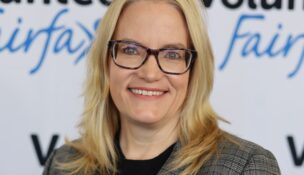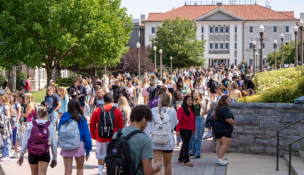Lessons from COVID-19
With pandemic’s end in sight, what are our takeaways?
Lessons from COVID-19
With pandemic’s end in sight, what are our takeaways?
For most of us, March 13 marked the one-year anniversary of our worlds ceasing to operate normally. We remember institutions closing, schools shuttering, and that last day in the office. These pandemic times have compelled me to reflect, learn and remember.
I was making ham biscuits for Easter when I heard Merle Haggard’s song, “Are the Good Times Really Over?” We must be more careful, thoughtful and selective, but our best days are still ahead — not in spite of COVID-19, but because of it.
These lessons and opinions are mine and do not necessarily reflect the views or opinions of anyone else, including my employer.
Don’t miss the simple experiences.
COVID-19 has required us to work and go to school from home. Proximity to family, without the distraction or outlet that extracurriculars provide, has made me focus on what is most important. I have been able to have dinner with my family almost every day — and sometimes even lunch. My son and I have experienced what Mr. Rogers once opined, “Pretending doesn’t require expensive toys.” My daughter still prefers the expensive toys. I’ve been in awe of how well my wife can manage our lives, while still practicing and teaching law.
These small experiences make up life, and are collectively more important, than the big events. COVID has made our entire family slow down. It’s helped me understand how much time I had previously spent away from home and has inspired me to rethink my commitments. Do I really need to miss dinner three or four nights a week? Could I prioritize my board service?
On her seventh birthday, my daughter told me, “It’ll be so sad when coronavirus is over, Daddy, because you won’t be home as much.” I’ve spent more time not only listening to my virtual first grader, but actually hearing her.
Isolation compels you to look inward.
It’s healthy to ask yourself tough questions, answer honestly and confront the findings. When you’re busy running between events, it’s difficult to take time out. But with fewer ballgames, only takeout and no in-person church, opportunities abound to assess your life. How strong is my relationship with my spouse? Am I contributing to my family adequately? Is my career fulfilling? Am I a good parent? Do I set a good example? Am I too busy living life that I’m not enjoying it or appreciating it? What am I doing every day to pursue my dreams? More than anything, I tell my kids that I want them to be thankful and kind. But it took a pandemic for me to assess whether I’m living up to that standard.
Your health and access to health care are an invaluable gift, not to be taken for granted.
Obviously. Now more than ever.
We’re not living up to our social and charitable ideals.
Charitable organizations, churches and governments purport to be focused on helping the elderly and the poor. We have a plethora of concerned people, with their hearts, minds and finances targeting upward mobility.
But these populations have been the hardest hit by COVID-19, compelling us to rethink how we can better respond. Even with Medicaid expansion, these groups often underutilize their medical benefits. They may not have the awareness, time or transportation to take advantage of the safety nets that are available.
It is complicated, but these service institutions bear some blame for overcomplicating it and not collaborating effectively. Getting all concerned parties on the same page is simple, but essential, in better serving these populations.
We must fairly explain to children about our country’s racial history and also its current inequities.
We have talked with our children about slavery, the Civil War and the civil rights movement. It has been important for us to focus on Virginia’s role in the founding of our nation since our family has been here all along. Our kids have these facts and comprehend them as kids do, but the past year has taught us that we must talk to them about the differences and disparities that still exist. Inherent or implicit bias in policing, housing, transportation, education, unemployment and health care are just some of the racial inequities that have been laid bare during this COVID era.
Last summer’s racial justice protests compelled many of us to have these conversations with our kids. Perhaps these dialogues are another silver lining to being home during COVID, a positive outcome from the social unrest, and will empower our kids’ generation to be the first to reduce these inequities instead of perpetuating them?
There is virtually no substitute for certain in-person experiences.
My wife and I have learned that online and drive-in worship services are not viable substitutes for gathering in person. The same is true for other cultural institutions, like the Richmond Forum.
Feelings of isolation from family and friends have been exacerbated by separation from our church family. It is nice to catch up with people on Sunday morning, share in their successes and challenges, and realize that not only are most of us having similar experiences, but we are here to know, support and pray for each other. We miss that time when we did not have to pick sides, consume real or social media or experience noise, even for just an hour.
We cannot wait to be back in the fellowship hall and the sanctuary, as well as the Altria Theater.
State government is the difference maker.
The state’s response to COVID has affected our lives more than the unreliable and inconsistent response we’ve seen from the federal government.
This puts a premium on who we elect later this year as governor, lieutenant governor and attorney general, as well as to the House of Delegates. The governor and attorney general will have the most to do on a daily basis to help us move beyond these current challenges and prepare for the next ones.
No one could have been adequately prepared to flawlessly manage our response over the last year. Authenticity, calm and experience taking care of children at pediatric hospitals and service members on the battlefield has served Gov. Northam well.
Who has real-life experience that has adequately prepared him or her to govern in a time of crisis? Who has thrived under real pressure and led well? In times like these, we can’t afford to allow candidates to fumble forward.
COVID has made the world different. No candidates should claim they are ready to serve Virginians, let alone ask for money or votes, unless their experience compels it.
The situation can always get worse.
Virginia’s first COVID case showed up at Fort Belvoir in Fairfax County. Then it spread. Schools were shuttered. We were considering building field hospitals, which were thankfully never needed. Then George Floyd was murdered, and peaceful protests and violent riots created a racial justice crisis.
Then we entered a bizarre political season where polarizing leaders politicized public and private health decisions, leading to further spread of COVID-19. The November 2020 presidential election made matters worse. COVID spiked because people didn’t follow health guidelines over Thanksgiving and Christmas. And then, a big group tried to take over the Capitol of the United States while Congress was tallying Electoral College votes.
We finally got a vaccine, but all levels of government were underprepared to distribute it. Lately, I keep reading about all the COVID variants, and we know that the pandemic will continue until essentially everyone is vaccinated.
Having learned that the situation can always get worse, it is hard to avoid worrying about what’s next. But with two shots in my arm, hand sanitizer in my pocket, and a smile under my mask for a little while longer, I’m deliberately focusing on how this situation will get better: in-person school, church in a pew, a date in a restaurant, flying in a plane, tailgating in a parking lot, and Christmas parties.
Even with all its carnage, perhaps another silver lining to living through COVID-19 is that it has prepared us for the next pandemic. Through many errors and trials, we have developed a playbook and hopefully it will be dusty when it’s needed again.
The late, great U.S. District Judge Jackson L. Kiser, for whom I clerked in Danville, once told me, “You never appreciate the water until the well runs dry.” He had just sentenced a bad guy, and his family was crying in the gallery as they said their goodbyes for a long time.
COVID-19 has compelled us to confront not only all that we have, but all that we have at risk. I remain optimistic that these lessons will help ensure that the good times really aren’t over for good.
A Shenandoah County native, Rhodes B. Ritenour lives in Henrico County with his wife and two children. He is vice president of external and regulatory affairs with Bon Secours Health System. A co-founder of The Diabetes Support Group, he previously worked as a policy staffer for Virginia Gov. Mark Warner, as a partner at the former LeClairRyan law firm, and served as deputy attorney general for civil litigation.
>
















